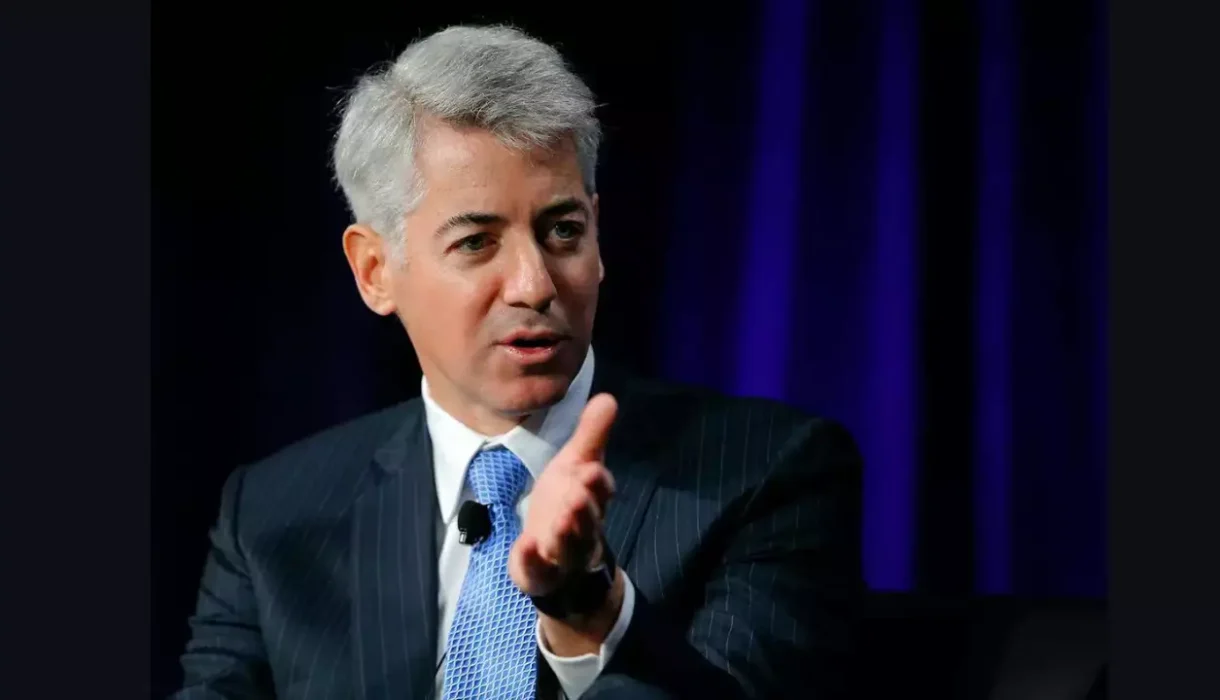
Economic Backlash: The Tariff Revolt of Trump-Backing Billionaires
Posted in :
Trump’s Tariff Revolt: Billionaires Warn of Economic Fallout
Recent backlash from notable billionaire supporters of Donald Trump regarding his tariff policies. It highlights their concerns about economic repercussions and the potential isolation of the U.S. in global trade.
In an unexpected twist, some of Donald Trump’s staunchest supporters in the financial world are speaking out against his tariff policies. These billionaires, who once rallied behind the President, are now sounding alarm bells about the economic fallout. This blog delves into their critiques and the broader implications for the U.S. economy.
The Shift in Investor Sentiment
The landscape of investor sentiment is changing. Once staunch supporters of Donald Trump, some billionaire investors are now vocal critics of his policies, particularly regarding tariffs. This shift is significant. It reflects deeper concerns about the economic stability of the United States and its position in the global market.
Notable Billionaire Critics
Two prominent figures in this narrative are Bill Ackman and Howard Marks. Both have made headlines for their criticisms of Trump’s tariff policies.
- Bill Ackman: A hedge fund manager known for his outspoken views, Ackman was once a major supporter of Trump. However, he has recently expressed strong disapproval of the administration’s approach to trade. He stated, “We are in the process of destroying confidence in our country as a trading partner.” This statement underscores his belief that the tariffs are harming the U.S.’s reputation globally.
- Howard Marks: Co-chairman of Oaktree Capital, Marks has also voiced his concerns. He noted the shift from free trade to a system that imposes significant restrictions on trade. His observations highlight the potential isolation the U.S. may face if these policies continue.
Previous Support for Trump
Both Ackman and Marks were once aligned with Trump’s vision. They believed in his ability to stimulate the economy and create jobs. However, their support was conditional. They expected policies that would foster growth and maintain the U.S.’s role as a leader in global trade.
As tariffs began to take effect, their optimism waned. The reality of the situation became clear. Tariffs were not just a bargaining chip; they were reshaping the economic landscape. The consequences of these policies are now evident, leading to a reevaluation of their support.
Current Criticisms Regarding Tariffs
The criticisms from Ackman and Marks are not isolated. They reflect a broader concern among investors about the implications of Trump’s tariff policies. Here are some key points:
- Economic Stability: Investors are worried about the long-term effects of tariffs on economic growth. Ackman’s phrase “self-induced economic nuclear winter” captures this sentiment perfectly. It suggests that the tariffs could lead to a severe economic downturn.
- Trade Relationships: Marks emphasizes the shift towards isolationism. The tariffs are seen as a move away from globalization, which could harm relationships with key trading partners.
- Market Reactions: The stock market has already shown signs of distress. Investors are bracing for potential downturns as the effects of tariffs ripple through the economy.
Influence on Market Perceptions
Billionaire investors like Ackman and Marks hold significant sway in the market. Their opinions can influence not only investor sentiment but also regulatory policies. When they speak out, the market listens. Their criticisms of tariffs are a call to action for other investors and policymakers.
As these billionaires express their concerns, they are not just voicing personal opinions. They are reflecting a growing unease among investors about the future of the U.S. economy. This shift in sentiment could lead to changes in investment strategies and a reevaluation of risk.
The shift in investor sentiment among billionaires like Bill Ackman and Howard Marks is a critical development. Their transition from supporters to critics of Trump’s tariff policies highlights significant concerns about economic stability and the future of U.S. trade relationships. As they raise their voices, the implications for the market and regulatory landscape could be profound.
Short-Term Implications of Tariff Policies
Tariff policies can have significant short-term implications for the economy. As these tariffs are implemented, they create a ripple effect that influences both imported and domestic goods. This section explores the inflationary pressures, market reactions, and insights from financial experts.
Inflationary Pressures on Imported and Domestic Goods
One of the most immediate effects of tariffs is the increase in prices. When tariffs are imposed on imported goods, the cost of those goods rises. This is because importers pass on the additional costs to consumers. But it doesn’t stop there. Domestic producers may also raise their prices in response to increased demand for their products, as consumers look for alternatives to the now more expensive imports.
- Imported Goods: Tariffs directly increase the price of foreign products.
- Domestic Goods: Local producers may raise prices due to heightened demand.
As Jamie Dimon, CEO of J.P. Morgan, noted,
“We are likely to see inflationary outcomes, not only on imported goods but on domestic prices, as input costs rise and demand increases on domestic products.”
This statement underscores the potential for widespread inflation across various sectors of the economy.
Predictions Regarding Market Reactions and Economic Growth
The stock market often reacts swiftly to tariff announcements. Investors are keenly aware of how these policies can impact economic growth. When tariffs are introduced, uncertainty looms. This uncertainty can lead to volatility in the stock market, affecting investor confidence.
Financial experts predict that the stock market may experience a downturn as a result of these tariffs. Historical data shows that similar policies have led to negative market reactions in the past. For instance, when tariffs were previously announced, stock prices often fell as investors anticipated higher costs and reduced consumer spending.
Howard Marks, co-chairman of Oaktree Capital, expressed concern about the shift from free trade to a more isolationist approach. He stated,
“We’ve gone from free trade and world trade and globalization to this system, which implies significant restrictions on trade in every direction and a step toward isolation for the United States.”
This shift could have long-lasting effects on market stability and economic growth.
Insights from Financial Experts
Financial experts are closely monitoring the situation. They provide valuable insights into how tariffs may shape the economic landscape. Jamie Dimon, in his letter to shareholders, emphasized the importance of understanding both the short-term and long-term effects of tariffs. He pointed out that while there may be legitimate reasons for implementing tariffs, the immediate consequences could be detrimental.
Dimon stated,
“Whether or not the menu of tariffs causes a recession remains in question, but it will slow down growth.”
This highlights a critical point: while tariffs may be intended to protect domestic industries, they can also hinder overall economic progress.
Volatility in the Stock Market
As tariffs take effect, the stock market is likely to experience increased volatility. Investors may react to news and predictions, leading to rapid fluctuations in stock prices. This volatility can create a sense of unease among investors, potentially affecting their willingness to invest in the market.
In the face of these uncertainties, many financial executives are urging caution. They are concerned about the long-term implications of tariffs on investor confidence. As Bill Ackman, a prominent hedge fund manager, pointed out,
“We are in the process of destroying confidence in our country as a trading partner, as a place to do business, and as a market to invest capital.”
This sentiment reflects the broader concerns about how tariffs may reshape the economic landscape.
In summary, the short-term implications of tariff policies are multifaceted. They can lead to inflationary pressures on both imported and domestic goods, create volatility in the stock market, and raise questions about economic growth. As experts weigh in, it becomes clear that the effects of tariffs extend beyond immediate price increases, influencing the overall economic environment.
Long-Term Consequences for U.S. Trade Relations
The landscape of U.S. trade relations is shifting. The recent tariff policies introduced by the Trump administration have raised significant concerns. Many experts warn of potential isolationism and its economic ramifications. This shift could reshape America’s role in global markets. But what does this mean for the future?
Concerns About Potential Isolationism
Isolationism is not just a buzzword; it’s a real concern for many economists and business leaders. When a country turns inward, it risks losing its competitive edge. The tariffs imposed by the Trump administration have led to fears of a “self-induced, economic nuclear winter,” as hedge fund manager Bill Ackman put it. This sentiment reflects a broader anxiety among corporate leaders.
What happens when a nation isolates itself? The implications can be dire. Trade relationships are built on trust and mutual benefit. If the U.S. is perceived as an unreliable trading partner, countries may seek alternatives. This could lead to a decline in exports and a slowdown in economic growth. As Jamie Dimon, CEO of J.P. Morgan, noted, “It will slow down growth.”
The Role of Wall Street Executives
Wall Street executives are not just passive observers in this scenario. They wield significant influence over policy decisions. Their voices carry weight, especially when they express concerns about the direction of trade policy. For instance, Howard Marks, co-chairman of Oaktree Capital, remarked on the shift from free trade to a more restrictive trade environment. He stated, “We’ve gone from free trade and world trade and globalization to this system, which implies significant restrictions on trade in every direction.”
These executives are increasingly vocal about their worries. They have been reaching out to the White House, urging for a reconsideration of the current tariff policies. The pressure is mounting. As quarterly results approach, many bank CEOs may feel compelled to speak out publicly. Their critiques could influence not only public opinion but also the administration’s approach to trade.
Pathways for Relief and Resolution
Amidst the turmoil, there are potential pathways for relief and resolution. The White House could reconsider its stance on tariffs. This would require a delicate balance between ideology and practical economic considerations. As Dan Loeb, another hedge fund manager, pointed out, “It will be a test of the administration’s judgment versus ideology.”
Finding a resolution is crucial. The longer the tariffs remain in place, the more damage they could inflict on the economy. The administration must weigh the short-term benefits against long-term consequences. The voices of billionaires and corporate leaders may represent broader corporate concerns. Their insights could guide policymakers toward a more balanced approach.
Historical Context and Economic Forecasts
To understand the current situation, it’s essential to examine historical trends in U.S. trade policy. The U.S. has a long history of imposing tariffs, often leading to trade wars. These conflicts have typically resulted in economic downturns. For instance, the Smoot-Hawley Tariff Act of 1930 is often cited as a catalyst for the Great Depression. The lessons from history are clear: protectionist policies can have severe repercussions.
Current economic forecasts suggest that if the tariff trajectory continues, the U.S. could face similar challenges. Inflationary pressures may rise, affecting both imported goods and domestic prices. As input costs increase, consumers may feel the pinch. This could lead to a decrease in consumer spending, further slowing economic growth.
The long-term consequences of the Trump administration’s tariff policies are still unfolding. Concerns about isolationism, the influence of Wall Street executives, and the potential for relief from the White House all play a role in shaping the future of U.S. trade relations. As the situation evolves, it will be crucial to monitor how these factors interact. The stakes are high, and the path forward remains uncertain. The voices of business leaders and the administration’s response will be pivotal in determining America’s role in the global market.
TL;DR: Despite their prior support, key billionaires are now raising concerns over Trump’s tariffs, citing potential economic isolation and market instability.
WallStreetReactions, TrumpTariffs, BillionaireInvestorsRevolt, U.S.TradeIsolation, InflationImpact, TradePolicyBacklash, MarketConfidenceCrisis, EconomicConsequencesOfTariffs
#EconomicConsequencesOfTariffs, #TradePolicyBacklash, #MarketConfidenceCrisis, #WallStreetReactions, #U.S.TradeIsolation, #InflationImpact, #TrumpTariffs, #BillionaireInvestorsRevolt,#TrumpTariffs, #EconomicPolicy, #BillAckman, #HowardMarks, #USEconomy, #WallStreet, #TradeWar, #Inflation, #InvestorSentiment, #GlobalTrade

